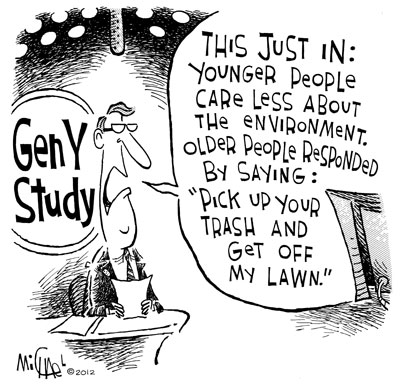Study: Millennials care less about the
environment

By Chrissy Kadleck | WRN correspondent
April 2 -- Contrary to widespread belief, high school seniors and incoming college freshmen care less about conserving energy or taking personal action to help the planet than previous generations, according to a recent study that analyzed 40 years of research.
Since the baby boomer generation, there has been a significant decline among young Americansī interest in saving the environment, according to the study "Generational Differences in Young Adultsī Life Goals, Concern for Others and Civic Orientation, 1966-2009," published in March by the American Psychological Association.
"There has been a lot of debate about the folks born since 1980," said Jean Twenge, the studyīs lead author and psychology professor at San Diego State University. "Some people call them millennials; other people call them Gen Y. I call them Gen Me. ... Some say they are unusually civically oriented. I had my doubts whether that was possible. I said, īGreat, letīs find all the data that we can.ī"
Twenge and her co-authors examined two large databases -- University of Michiganīs Monitoring the Future, which surveyed close to half a million high school seniors from 1976 to 2008, and the American Freshman survey by UCLAīs Higher Education Research Institute, which polled nearly 9 million entering college students between 1966 and 2009.
The results?
Less civic engagement and less interest in politics and social issues among millennials (surveyed between 2000 and 2009), than Generation Xers (surveyed between 1979 and 1999), and baby boomers (surveyed between 1966 and 1978). But the real surprise came when Twenge, author of the book "Generation Me: Why Todayīs Young Americans Are More Confident, Assertive, Entitled -- And More Miserable Than Ever Before," said she noticed the large number of questions regarding the environment and started analyzing those.
"Thatīs what qualifies these days as civic engagement is caring about the environment and itīs an example of an issue that has gotten a lot of attention recently," she said. "So I thought, īWouldnīt that be an interesting story, if we had overall civic engagement going down but then the environment would be the exception?ī I started analyzing them, and I was just shocked to see that they showed the same downward pattern, and in fact the declines are even larger in the environmental items than they were in the others."
For instance, the desire to save the environment, an area believed to be of particular interest to millennials, showed some of the largest declines, with three times as many millennials as baby boomers at the same age saying they made no personal effort to help the environment.
"At first I thought maybe it was just the wording of the items, particularly from the American Freshman data set that asked about cleaning up the environment," she said. "And I thought back in the ī70s, Lake Erie was on fire, and you couldnīt breathe in Los Angeles, so perhaps there was a perception that the environment is now clean so that is not as important. When I went to the high school database, there was a very diverse list of items, and they showed the same pattern."
According to the study, millennials thought less about social problems, showed less interest in government, made less effort to conserve energy and expressed less interest in taking "green" actions to protect the environment, either personally or through the government. In addition, "becoming involved in programs to clean up the environment" decreased, from 33% for boomers to 20% for millennials. Fifty-one percent of millennials said they made an effort to cut down on electricity use to save energy compared to 68% of boomers in the 1970s.
Twenge said the overall declines were linear: Boomers cared more than Gen Xers, and Gen Xers cared more than millennials.
"At base, I think a lot of it is we are just not willing to make sacrifices in the way previous generations may have been better at doing," she said. "Thatīs something that has kind of fallen off the radar screen in our culture, and generations reflect culture," she added, noting that the most recent survey data was collected before the prolonged recession. "Itīs very possible now that we have $4 gas, and a recession that has dragged on for a long time that we could see some improvement in those items," she said. "That would not surprise me at all. I donīt think they are going to go back all the way to what they were in the ī70s. But when it hits people in the pocket book thatīs something everybody understands, so you could see some change just for that reason."
Contact WRN correspondent Chrissy Kadleck at ckadleck@sbcglobal.net.
![]()
w w w . w a s t e r e c y c l i n g n e w s . c o m
copyright 2012 by Crain Communications Inc. All rights reserved.